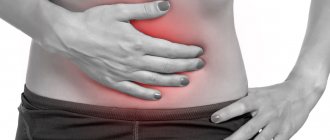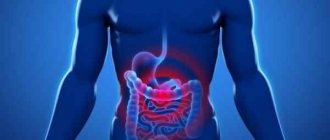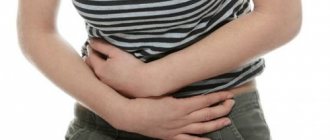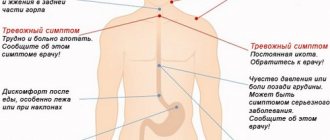Many people are familiar with the feeling of a full stomach. It seems that you have eaten very little, but your stomach is full, it’s even hard to breathe. The sensation is unpleasant, and may also be accompanied by symptoms of indigestion or increased gas formation. This happens not only after one-time overeating of “heavy” foods or sweets, but also due to diseases of the organs involved in the digestive process - gastritis, pancreatitis, cholecystitis or other pathologies.
There are many reasons for this condition and not all of them are harmless, some are dangerous.
Physiological reasons
A feeling of rapid filling of the stomach, accompanied by distension in the upper abdomen, can occur in healthy people. This passes quickly and does not pose any harm to health.
The main reasons causing rapid satiety and stomach discomfort:
- Very often, a feeling of heaviness in the stomach occurs after eating a large amount of foods that are called heavy - meat, mushrooms, eggs. Eating at night in combination with alcohol aggravates the situation. The stomach cannot cope with a large number of products of different composition; they enter the duodenum almost unchanged. The normal process of digesting food is disrupted.
- The digestive system of some people is not able to break down lactose (milk sugar), remaining unchanged, lactose in the intestines begins to ferment, causing increased gas formation and bloating.
- Allergy to certain foods. It also manifests itself as heaviness and distension in the stomach.
- The feeling of fullness in the stomach is familiar to pregnant women in the last stages of pregnancy. The internal organs are in a compressed state, and even a small amount of food taken is perceived inadequately by the body. Heartburn, belching, and nausea may bother you. After childbirth, such symptoms disappear.
- A similar feeling appears in heavy smokers due to constant irritation of the mucous membrane of the digestive organs by nicotine.
- Big fans of drinks with ice or gas experience similar discomfort.
- A heavy feeling in the stomach sometimes accompanies tourists on trips to exotic countries due to a sudden change in diet and the desire to indulge in the delicacies of local cuisine.
- Accelerated satiety accompanies functional disorders of the digestive system in patients experiencing serious psychological stress or deep negative experiences. This condition may be accompanied by symptoms of functional irritable bowel dyspepsia due to reflex dysmotility or increased sensitivity of the gastric nervous system to distension. The patient is bothered by pain, heaviness, periodically accompanied by belching and vomiting.
In the above cases, heaviness in the stomach is not a symptom of a serious disease of the internal organs. But when they appear, and even more so frequently recur, you need to seriously analyze your lifestyle and diet. Otherwise, if you do not give up unhealthy habits, you can get persistent disorders of the digestive organs, which over time will develop into serious diseases - gastritis, ulcers, pancreatitis or cancer.
Other symptoms
Feeling of a full stomach - after eating
A feeling of a full belly is most often a sign of indigestion or illness. In such cases, against the background of abdominal bloating, other symptoms may appear that aggravate the patient’s general condition.
Sometimes external bloating may not be accompanied by discomfort. Such cases are often associated with anatomical abnormalities and features of the stomach.
Symptoms to watch out for:
- Fever.
- Skin rash or hives.
- Sore throat, itchy eyes and other signs of allergies.
- Constipation or diarrhea.
- Nausea and vomiting.
- Blood in urine and stool.
- Weight loss.
- Soreness and swelling of the lymph nodes in the groin area, neck and armpits.
- Constant fatigue.
- Problems concentrating.
- Lump in the anal area.
The listed symptoms may indicate the presence of a more severe pathology, manifested by a feeling of fullness in the stomach. Allergic reactions, poisoning and bleeding are especially dangerous.
Pathological causes
In cases where a person eats properly and leads a normal lifestyle, without excesses, and begins to feel heaviness in the epigastrium and bloating after eating, or, even worse, heaviness in the abdomen bothers you in the morning, before breakfast, perhaps the cause is a disease. Many pathologies of the digestive system have similar accompanying symptoms. First, such vague complaints appear, which then become more characteristic of each disease.
Gastritis, peptic ulcers of the stomach and intestines, pancreatitis, cholecystitis, cancer and many other diseases begin with a feeling of heaviness and fullness in the stomach.
- With gastritis, the inner surface of the stomach lining becomes inflamed. The patient complains of pain, feels nauseous, and often vomits.
- With an ulcer, the mucous membrane inside the stomach is not only inflamed, it is also covered with wounds that vary in size and depth. The patient's condition worsens, the pain becomes more intense, sometimes unbearable, and begins to occur at night and on an empty stomach. If left untreated, a peptic ulcer can be complicated by internal bleeding or perforation, that is, at the site of the ulcer, the stomach wall breaks through and a message is created with the abdominal cavity, into which the contents of the stomach enter. In these cases, only urgent surgery can save a life. Quite often, untreated peptic ulcer disease is complicated by pyloric stenosis, and the opening connecting the stomach to the intestines becomes overgrown. Food cannot leave the stomach. The condition is dangerous; without urgent surgery, the patient may die.
- With pancreatitis, the inflammatory process affects the pancreas. It produces digestive enzymes, without which the process of digesting food cannot take place. The function of this important organ is limited or becomes impossible. The patient complains of bloating, intense girdle pain in the upper abdomen, on the left, heaviness.
- With cholecystitis, the feeling of heaviness after eating turns into pain of a different nature - from nagging, dull to unbearable, localized in the right hypochondrium. Attacks are often accompanied by nausea, vomiting and stool disturbances, because the intestines do not receive enough bile for normal absorption of foods and the digestion process is disrupted.
- Oncology. Perhaps the most dangerous and unpredictable disease is cancer. For a long time it does not manifest itself in anything other than a slight feeling of heaviness in the epigastrium or a full stomach. When more clear or painful symptoms appear, the tumor has usually already reached a significant size, and the prognosis for recovery is questionable.
What home remedies can you use to relieve the discomfort of stomach sucking?
When sucking in the stomach, it is important to follow a proper diet and take small portions of food, avoiding long breaks between them. Avoid large portions if sucking and burning causes reflux.
Small portions of food
If there is sucking in the stomach after eating, this may mean that the delicate wall of the stomach is irritated and the foods consumed cause discomfort.
Avoid foods such as:
- coffee and alcohol - increase acid secretion in the stomach, which increases reflux, in addition, irritate the gastric mucosa;
- carbonated drinks - increased volume in the stomach;
- processed products containing monosodium glutamate;
- sweets, especially chocolate, delay gastric emptying.
The feeling of stomach sucking caused by peptic ulcers or reflux disease can be slightly reduced by changing your current lifestyle.
For this it is recommended:
- weight loss, and in people with normal weight - maintaining it;
- stop smoking;
- eat food at the classic time - not at night;
- prepare small portions of food;
- avoid hot foods
It is advisable to plan your last meal a maximum of 3 hours before bedtime, and also sleep with your head raised 20 cm.
In any case, you need to understand that any symptom of gastrointestinal diseases will not go away on its own - the pathology must be diagnosed and treated. Therefore, if your stomach sucks regularly, you need to contact a gastroenterologist and undergo an examination. At the same time, now, in order to detect the Helicobacter pylori bacterium, it is not necessary to swallow a tube - there are breath tests. And many pathologies can be detected by donating blood or undergoing an ultrasound of the abdominal cavity. A good gastroenterologist sees him at the Diana Clinic in St. Petersburg.
ONLINE REGISTRATION at the DIANA clinic
You can sign up by calling the toll-free phone number 8-800-707-15-60 or filling out the contact form. In this case, we will contact you ourselves.
If you find an error, please select a piece of text and press Ctrl+Enter
Treatment
Diseases of the digestive system occur with similar symptoms, and the treatment in each described case is different. Only a doctor can understand the situation after an examination. And he will fight not with the symptoms of the disease, but with the cause that caused them.
If you know why the unpleasant condition occurred or this happened for the first time, you can use some remedies that will not cause harm. However, if the condition worsens, you cannot do without the help of a specialist.
Medicines prescribed to eliminate stomach discomfort are aimed at eliminating symptoms, restoring the digestive and motor function of the stomach and the patient’s normal well-being.
How to warn?
In order for a person not to be bothered by a full stomach, it is necessary to eat rationally, avoiding overeating. Stress and other disturbances in the psycho-emotional state negatively affect digestive function, so they protect themselves from such situations. An important preventative measure for feeling overcrowded is to give up bad habits. It is recommended to spend more time in the fresh air and do light exercises every day.
November 21, 2020, 7:13 am 2 comments 169,702
I ate a little, but I felt like I had eaten too much, my stomach was full, I felt heaviness, fullness, distension, bloating. What could it be? What are the reasons for this condition? Why is there a constant feeling of a full stomach, even when I haven’t eaten? What to do? How to treat? Unfortunately, people ask themselves these and similar questions already too late. Stop, listen to what your body wants to say. Perhaps this will save you from serious consequences.
IT IS IMPORTANT TO KNOW! Even “advanced” ulcers or gastritis can be cured at home, without surgery or hospitals. Just read what Galina Savina says and read the recommendation.
Very important! Savina G.: “I can recommend only one remedy for the quick treatment of ulcers and gastritis” read more.
Folk recipes
Treatment with traditional medicine is very effective. The absence of side effects and addiction, and the ability to prepare it at home from available ingredients speak in its favor. Can be taken at any age. The only limitation is individual intolerance to the components.
Some recipes:
- A decoction based on elecampane root. Mix a teaspoon of elecampane, crushed to a fine powder, with a glass of water and boil under a lid over low heat for 30 minutes. Cool. Take a quarter glass twice a day before meals.
- Propolis and sea buckthorn oil. Propolis tincture and sea buckthorn oil can be bought at the pharmacy. Take an hour before meals, adding 25 drops of tincture and oil to milk or water.
- Chamomile. Take one teaspoon of dried chamomile flowers and pour boiling water over it. After infusion, drink several times a day.
- Aloe and honey. Remove the thorns from 1 kg of aloe leaves, grind them, using a meat grinder, add an equal amount of honey. Keep in the refrigerator for 14 days. Take a tablespoon before meals.
Bloating due to pancreatitis or stomach cancer
Pancreatitis is the inability of the pancreas to produce enzymes to digest food. Symptoms of pancreatitis:
- the stomach is full, even if the stomach is not filled with food;
- feeling of fullness in the stomach when eating a small amount of food;
- nausea, possibly vomiting;
- pain in the umbilical region;
- “fat”, light-colored feces.
Stomach cancer. The disease is dangerous because it cannot be recognized immediately. The symptoms are similar to those of gastritis, so many people do not attach much importance to this, and when they consult a doctor, it may already be too late. However, one should suspect a dangerous disease when a person loses weight for no reason, is weak, gets tired quickly, and has a slightly elevated body temperature.
Prevention recommendations
Following simple rules will help reduce the risk of diseases of the stomach and other digestive organs:
- Be sure to follow the rules of personal hygiene.
- Limit or completely eliminate heavy and unhealthy foods, carbonated drinks, cigarettes and alcohol.
- Maintain a daily routine and avoid excessive physical activity.
- Exercise.
- Try to avoid stressful situations.
- Take as little medications as possible without a doctor’s prescription.
- Get preventive medical examinations every year.
( 3 ratings, average: 4.33 out of 5)
Carrying out diagnostics
To determine the cause of constant heaviness in the stomach and nausea, you need to contact a doctor, who will refer you for an examination. It should be carried out by a gastroenterologist who can make the correct diagnosis based on the collected medical history. To determine the main cause of the pathological process, you need to take blood and urine tests, and also do a cardiogram.
A biochemical blood test helps assess the level of liver parameters, which increase with liver pathologies, which is typical for pancreatitis. Ultrasound diagnostics of the abdominal cavity allows you to assess the size and structure of the liver, the presence of stones in the gall bladder, as well as the features of the pancreas, which allows you to make a correct diagnosis and determine the presence of problems with the digestive system.
Abdominal tomography is performed if there is a suspicion of a malignant tumor of the stomach, intestines or liver. And also a similar research technique makes it possible to determine its localization and the extent of spread of metastases to neighboring organs.
After an appointment with a gastroenterologist, you need to conduct an endoscopic examination of the stomach, an X-ray examination of the digestive tract and ultrasound diagnostics of the abdominal cavity.
Based on the examination, the doctor will be able to make the correct diagnosis and prescribe appropriate treatment. However, it is worth noting that the disease may be endocrine or neurological in nature, which is why consultation with other specialists may be required.
Useful video about heaviness in the stomach
Many people are familiar with the feeling of a full stomach. It seems that you have eaten very little, but your stomach is full, it’s even hard to breathe. The sensation is unpleasant, and may also be accompanied by symptoms of indigestion or increased gas formation. This happens not only after one-time overeating of “heavy” foods or sweets, but also due to diseases of the organs involved in the digestive process - gastritis, pancreatitis, cholecystitis or other pathologies.
There are many reasons for this condition and not all of them are harmless, some are dangerous.











